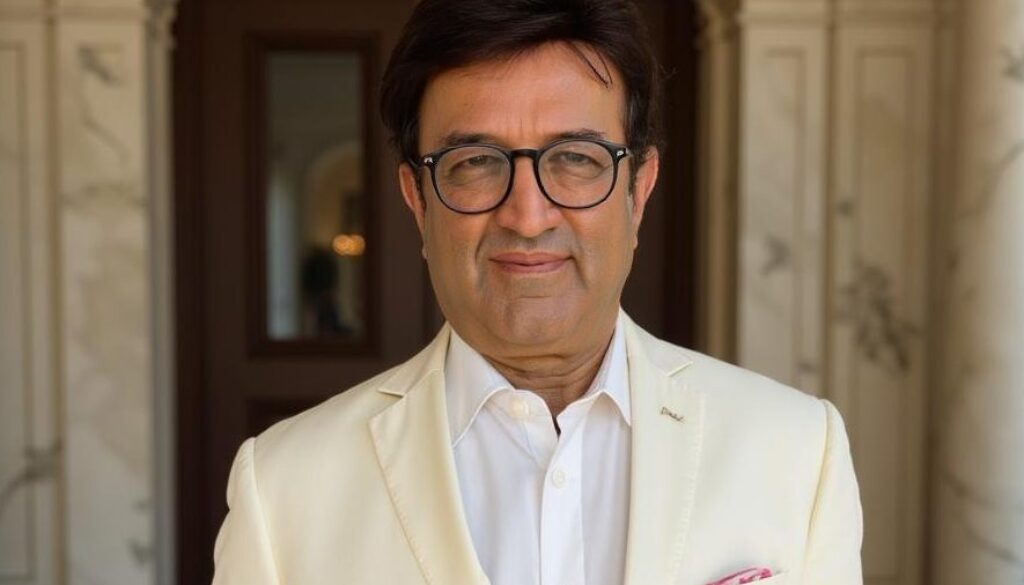From mainframes to music: Pradeep Udhas on reinvention, relevance, and the rhythm of business
In a wide-ranging conversation with Kesav Dama, veteran consultant and former KPMG leader Pradeep Udhas reflects on his journey across tech, consulting, private equity, boards and music, and why adaptability and trust will define the next era of business.
By Kesav Dama
Few people move between boardrooms, codebases, and concert halls with the fluency of Pradeep Udhas. Over a four-decade career spanning IBM, private equity, and founding roles at both KPMG India and a high-end tech startup, Udhas has quietly shaped how business, technology, and trust intersect. Now a board director across India and the U.S., he reflects on everything from AI’s disruption to the human value of music — and why reinvention remains his greatest skill.
Kesav Dama: There is a perception that a consultant is like a jack of everything but a master of nothing. How did you get into consulting?
Pradeep Udhas: I have a very different view on that. It is true that as consultants, we often move from one engagement to another, changing clients and even industries. This can prevent gaining deep operational expertise in one domain, the way someone working in a single company or industry might. However, the consulting industry has significantly evolved over the years. The perception that consultants only deal in generalities or high-level theories is outdated.
Today, top firms like McKinsey, BCG, and the Big Four have deeply specialized business units that focus on specific industries. Clients are far more discerning than they were two decades ago — they demand insights that are both informed and actionable. If a consultant walks in with a generic, cut-and-paste presentation, it won’t be accepted just because it comes with a big brand name.
My career started in a more technical lane. I began with IBM after completing my computer science MBA in the U.S. I started as a programmer using mainframe languages like Fortran, COBOL, and IMS. The first time I saw a computer, it occupied an entire room. Those early experiences grounded me in the tech world. At IBM, I gradually moved into management and market-facing roles. When I joined KPMG, I focused on the tech industry, which was emerging in India. My background in technology helped me converse fluently with executives in companies like Infosys, Wipro, and TCS. At the time, the Indian software services sector was just taking off, and many executives admired my U.S. experience with IBM.
Eventually, I expanded my work into banking and financial services. I’ve always believed that staying in a comfort zone limits growth. As I moved up the ladder, I interacted with clients from various industries and had to understand each one deeply. Later, I also worked in private equity with Greater Pacific Capital, where you need to go even deeper, because you’re putting money on the line, not just advising.
When did you start with KPMG?
I joined KPMG in 1994. My decision was shaped by a desire to apply my tech and consulting experience in a broader, more strategic way. KPMG’s work with emerging sectors allowed me to bridge my technical roots with business insights. Over time, I took on different roles and got involved in setting up new business practices.
You seem like an entrepreneur masquerading as an accountant!
Yes, absolutely! And inside that heart is also a musician. Performer!
We will come to the music part in a bit. What are your thoughts on AI and its role in consulting?
AI is moving faster than anything we’ve seen before. If we had this conversation a month ago, I’d have said something different than today, and in another two months, the narrative will shift again. That’s how rapidly things are changing. What began as a set of tools driven by machine learning is evolving into systems that self-learn and adapt. AI won’t just improve business processes; it will reimagine them entirely. Transformation is when you take something existing and enhance it; reimagination is when you tear it down and rebuild from scratch. For example, think of how we used to write songs, conduct meetings, or design workflows — AI is redefining all of that. Traditional departmental structures will dissolve. It will just change. It is changing. It is already happening. And our lives are going to change and our next two, three generations, who knows, we can’t even imagine. I feel like, in a way, it’s becoming beyond human imagination.
READ: Tapping into India’s growth engine, Monsoon Pabrai launches NSE investment vehicle (June 13, 2025)
In industries like pharma, where companies are known for long-term employment and structured departments, how will AI impact hiring?
It will become a matter of survival of the fittest. The reality is that businesses are accountable to their customers and stakeholders. Revenue, efficiency, and innovation will always be key drivers. Companies that can evolve and integrate AI effectively will thrive. Those that cling to outdated processes will fall behind.
While some pharma companies may retain their paternalistic culture for now, especially due to protected revenue from patented drugs, over time, even they will feel the pressure to automate, innovate, and streamline. AI might not immediately lead to mass layoffs in such firms, but it could certainly limit future hiring or redirect roles into more strategic areas.
So companies like Pfizer or Merck might maintain employment levels, but tech and retail could see cuts. Do you agree?
Yes, and we’re already seeing it. In retail, many traditional roles have disappeared or morphed into delivery-based jobs. Malls are closing or transforming into distribution hubs. Many young people are taking up roles in quick delivery services. A brilliant friend once told me, “There will be two kinds of people: those above the cloud and those below it.” That analogy applies to AI, too. Those who learn to work with AI will excel. Others might struggle. And you’re right, certain professions like electricians, plumbers, and nurses are not going anywhere. They are tied to physical reality, which AI can’t replicate.
With heavy funding in Quick Commerce platforms like Zepto and Blinkit, will this model be sustainable in the long term?
I believe that as long as humans have physical needs, services that meet those needs will persist. You can’t virtualize food or plumbing. So yes, quick commerce and home services will stay relevant. But the model might evolve. I foresee competition intensifying, not just between companies, but among individual delivery partners. Imagine being able to select your delivery person based on past performance, container quality, or punctuality. The market could introduce dynamic pricing, loyalty programs, and personalized logistics. The next phase of evolution in this space will be about differentiation and user experience. However, it may change in the way that some competition should come because a lot of these delivery organizations are there. Maybe when you say you order something on Swiggy or Zomato, you can pick your delivery partner and there could be competition saying, I want A versus B because B always delivers in a better container or they’re always on time. So, you may choose. Maybe they will compete with each other and say, you know, I’m giving you 10 discounts for my delivery, you know, and people might say, okay, let me choose this delivery partner. But I think the physical world will exist, you know, as long as humanity is there.
AI is increasing economic inequality. Will this lead to a split society?
Inequality is indeed growing. But I don’t believe this is limited to a white-collar versus blue-collar divide. Some blue-collar jobs may actually become highly remunerative if they become scarce and specialized. The key is adaptability. Whether in the boardroom or in the field, those who keep learning and evolving will continue to stay relevant.
READ: The angel investor who built a gaming unicorn says the AI hype will make many people lose money (June 17, 2025)
You graduated from Union College in 1982 with an MBA. What would you advise today’s MBA graduates or young professionals entering the workforce? What career path should they go given our new paradigm?
When I earned my MBA in computer science back in the early ’80s, it was a new and exciting field. In those days, an MBA was a ticket to a respectable career path. Over time, that changed. Today, unless you graduate from a top-tier institution that offers meaningful internships and applied learning, an MBA may not hold the same weight. Pairing it with a technical or specialized skill is essential. But more than degrees, what matters is curiosity. The hunger to learn can take you further than any credential. Also, building strong networks matters immensely. Sometimes it’s not about what you know but who you know, and more importantly, who trusts you.
You began with KPMG US and then helped launch KPMG India. Can you elaborate?
Yes, after a decade at IBM, I moved to KPMG in the US. When KPMG planned to enter India, they asked if I’d be willing to help set up operations. I had already played a role in bringing IBM back to India in 1990, working with TCS and Wipro for software development. At that time, PwC, Deloitte, and EY had long-established operations in India. KPMG was new. People even said that our name sounded like a radio station. But we took a calculated risk. Instead of competing for legacy clients, we focused on the nascent but fast-growing IT sector. We quickly gained market leadership in this segment.
You then launched your own company, e2e Technologies. What happened there?
Yes, in 2000, I felt that Indian IT companies were largely doing low-end work. I wanted to build a company focused on solution architecture and analytical services. We got good valuation from VCs, and even raised millions. But 9/11 and the dotcom bust pulled the rug out. Despite not being a dotcom company, we were affected. I eventually sold the company and moved into private equity with Greater Pacific Capital. Later, I returned to KPMG and finally retired in 2022.
What led to your retirement from KPMG?
I had spent decades in demanding roles, and I wanted to explore board positions, which KPMG policies didn’t allow. I also wanted to dedicate time to my music. The travel, the 15-hour days — it was time for a shift. Now, I advise boards and spend time on my creative pursuits.
If you were to launch a startup in 2025, what industry would you choose?
It’s an interesting question, and I’ve not thought about it, but definitely something AI-based. I would love to be in a sector that can be completely disrupted. I enjoy foundational thinking, rethinking how things work, and how they could be rebuilt differently. That’s where innovation happens.
Tell us more about your music. You came to Mumbai in your teens. So, back then who were your favorites? Or was it singing or just acting?
Music has always been in my blood. My family has been involved in music for generations. The late ghazal singer Pankaj Udhas and his brother Manhar Udhas are my cousins. I learned classical music in Rajkot and continued in Mumbai. At St. Xavier’s, I won college and inter-university singing competitions. I was the music director for the 1999 film “Hothe, Hothe, Pyar Hogaya,” starring Jackie Shroff and Kajol. I have sung in some movies as a playback singer. One of them will be released sometime this year. I’ve an album that I have composed that will be digitally released on all platforms. It’s a labor of love.
Of course, growing up my favorites were Kishore Kumar, Mohammad Rafi, Mehdi Hassan and Lata Mangeshkar.
Music helped my career, too. At KPMG, clients would remember me as the singing consultant. I even sang at a Tech Mahindra event, which led to a conversation with Anand Mahindra and eventually a business engagement. About 10 years ago, when I was posted in New York for a KPMG global assignment, Tech Mahindra was having a major offsite event for U.S. employees. C.P . Gurnani, then the CEO, invited me to the event. I was sitting with Gurnani and Mahindra Group Chairman Anand Mahindra. They requested me to sing and I sang two songs that were favorites of Anand. He was so happy and asked me to meet him during my next trip to Bombay. When I went to Bombay, he gave me an hour. “Remember that Kishore Kumar song you sang?” was how he started and he asked me to sing in his office — just him and I alone. We are jamming together in his office. And in the last five to 10 minutes. I said, “You know, I came all the way from U.S. for some business. We should talk about that.” So, he said, “Yeah, tell me, what is it that we can do?” I said, “You know, KPMG can do this, xyz, this, all these things.” Then he said, “When you go back, you’ll get a mail from my U.S. CEO, and that will be done.” So music builds connections.
Any thoughts on acting or directing?
Acting? Probably not. I did a video shoot where I played a man heartbroken in a bar — it was tougher than I expected! Directing, maybe. Writing a book — definitely. I’ve been thinking of a book on “chain of trust,” based on lessons from my consulting life. Trust is the foundation of everything. Without it, systems become bureaucratic. With it, efficiency thrives.
Tell us about your involvement with TiE.
I started with TiE Mumbai, then became President, and later served on the global board. I commissioned a report with KPMG to show TiE’s massive contribution to global entrepreneurship, over half a trillion dollars in wealth created. Mentorship has been key. One founder I advised in Ahmedabad now runs a successful animal vaccine company. He was persistent, always finding ways to meet and learn. Today, he owns his own aircraft. These success stories make it all worthwhile.
Since music has been such a creative outlet and catalyst for you, any new projects our readers should know about?
Absolutely — “Rubaru Tum Se Jo Hua” just dropped, It’s a piece very close to my heart. Listen to “Rubaru Tum Se Jo Hua”:
Spotify: https://open.spotify.com/track/3r3bqWf2ZqzcuXkBJFKkA2
Apple Music: https://music.apple.com/us/album/rubaru-tum-se-jo-hua-feat-sameer-phaterpekar/1742235247?i=1742235248
YouTube: https://www.youtube.com/watch?v=s0X62r_UuOE
JioSaavn: https://www.jiosaavn.com/song/rubaru-tum-se-jo-hua/NRpaQyVmRnc



